Find Help
More Items From Ergsy search
-
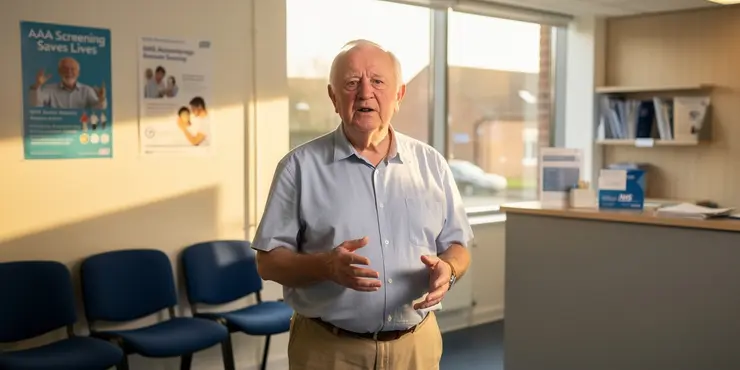
Survivor of an Abdominal Aortic Aneurysm rupture appeals for men to take up NHS Screening Programme.
Relevance: 100%
-
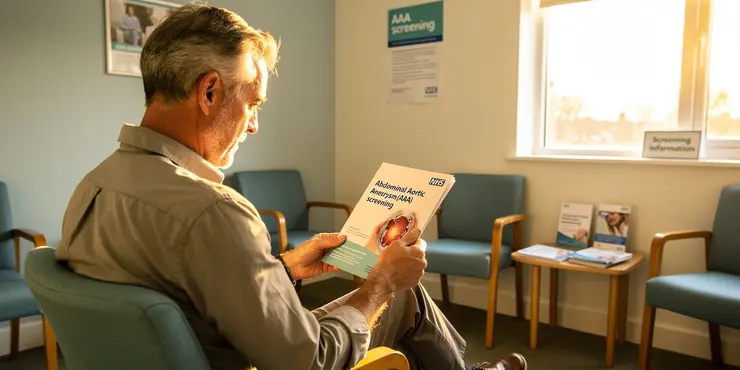
Abdominal Aortic Aneurysm (AAA) screening programme
Relevance: 94%
-
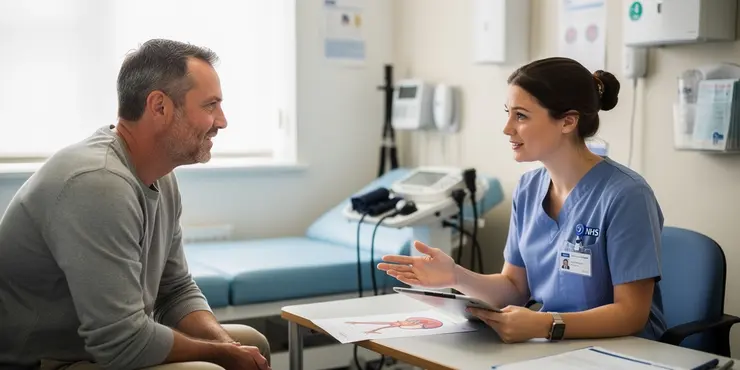
AAA (Abdominal aortic aneurysm) screening
Relevance: 85%
-
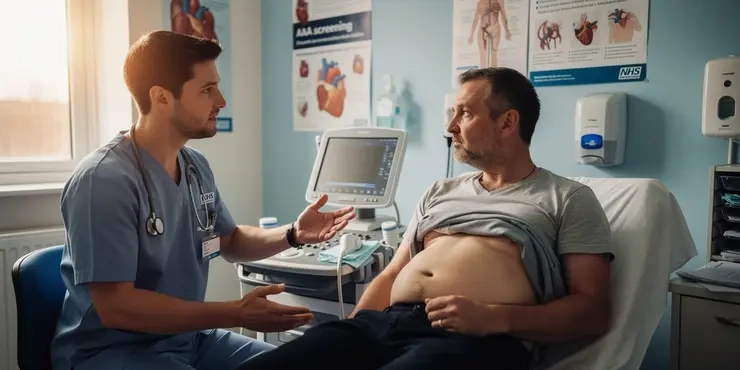
NHS Abdominal Aortic Aneurysm (AAA) Screening
Relevance: 83%
-
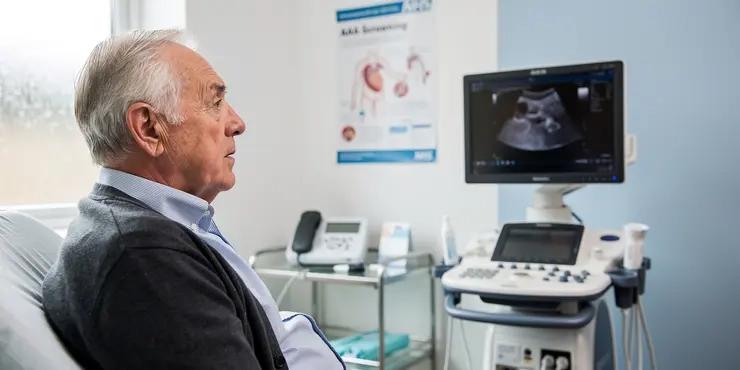
Eddie's Story - Abdominal Aortic Aneurysm (AAA) Screening
Relevance: 83%
-
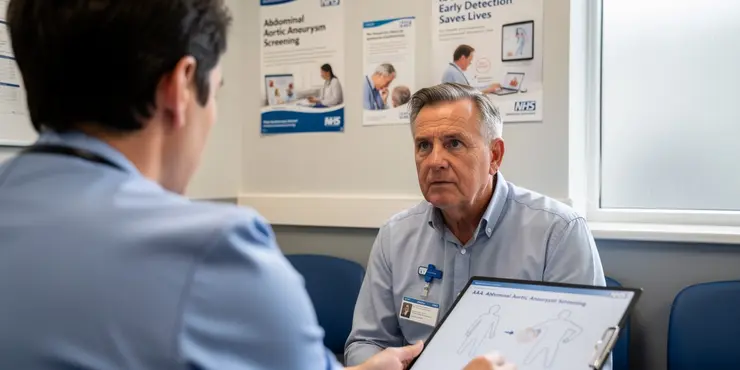
Your abdominal aortic aneurysm (AAA) screening appointment
Relevance: 78%
-
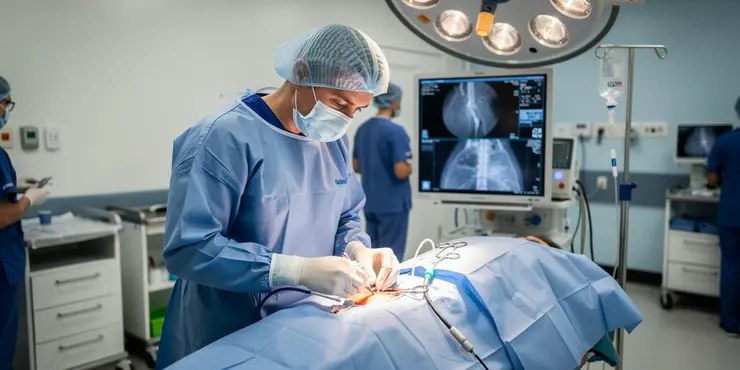
Repairing complex aortic aneurysm
Relevance: 62%
-
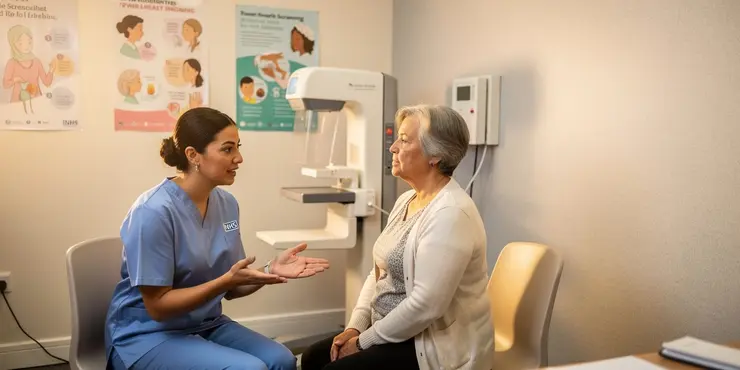
Tower Hamlets breast screening programme
Relevance: 32%
-
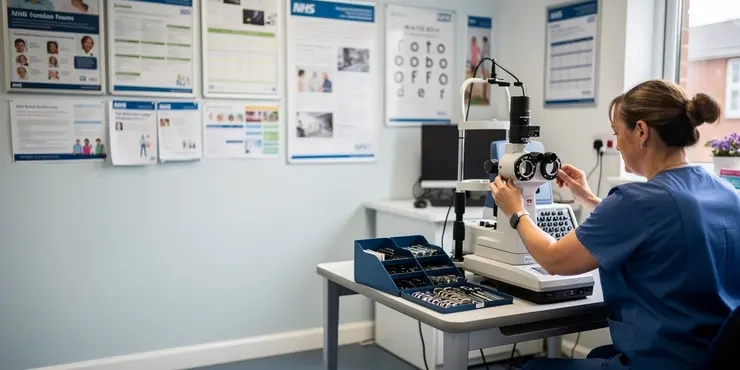
North Yorkshire Diabetic Eye Screening Programme - A day in the life
Relevance: 29%
-
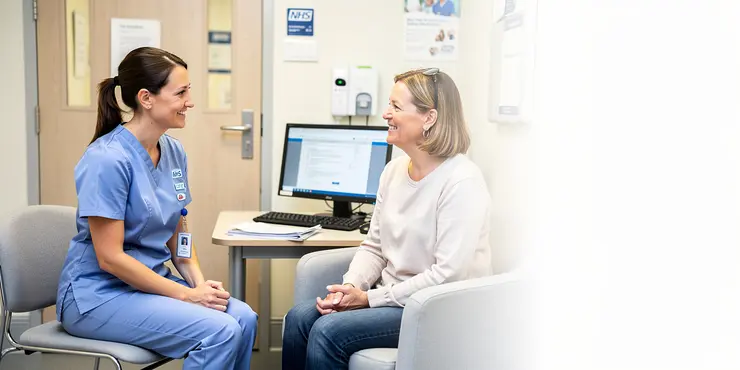
Health Screenings You Should Know About
Relevance: 23%
-
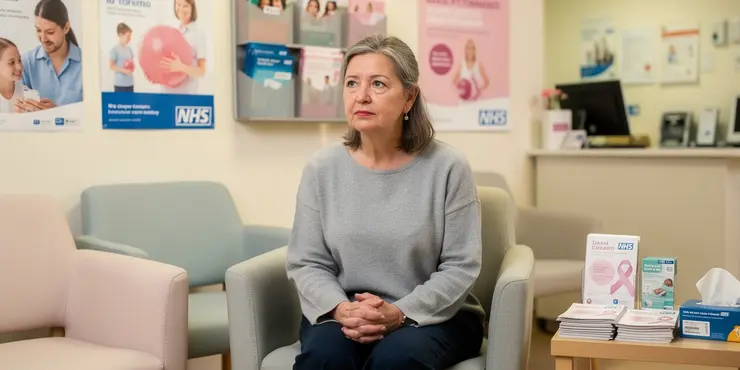
NHS breast cancer screening
Relevance: 21%
-
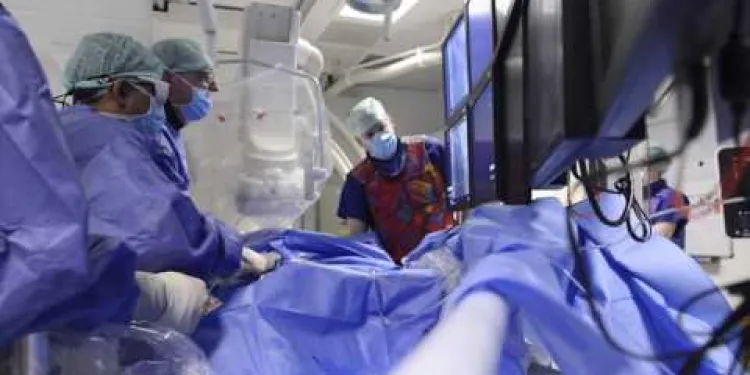
What is it like having a Transcutaneous Aortic Valve Implant (TAVI)?
Relevance: 21%
-
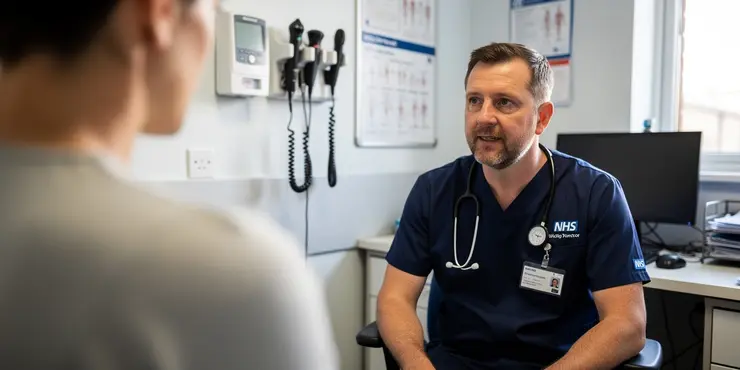
How is appendicitis different from other causes of abdominal pain?
Relevance: 20%
-
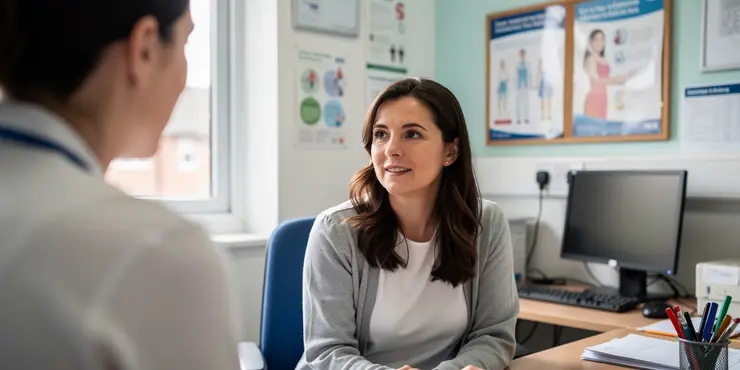
Stomach ache and abdominal pain
Relevance: 20%
-
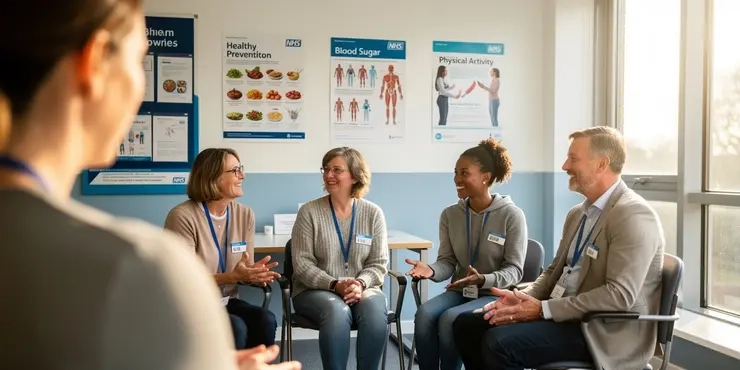
The NHS Diabetes Prevention Programme story
Relevance: 20%
-
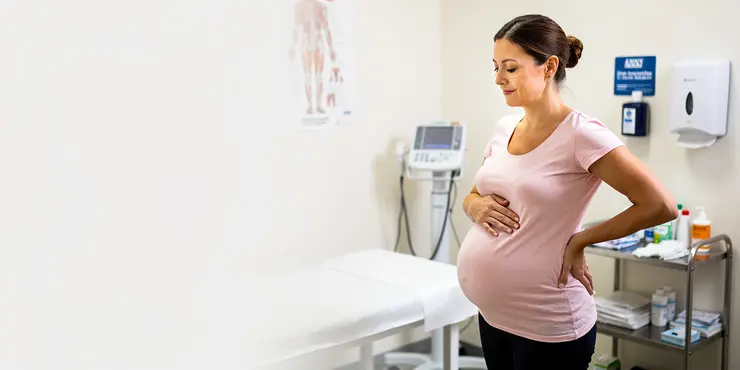
Can I do abdominal exercises during pregnancy?
Relevance: 20%
-

Facial exercise programme
Relevance: 19%
-

Pam’s story - The NHS Diabetes Prevention Programme
Relevance: 19%
-
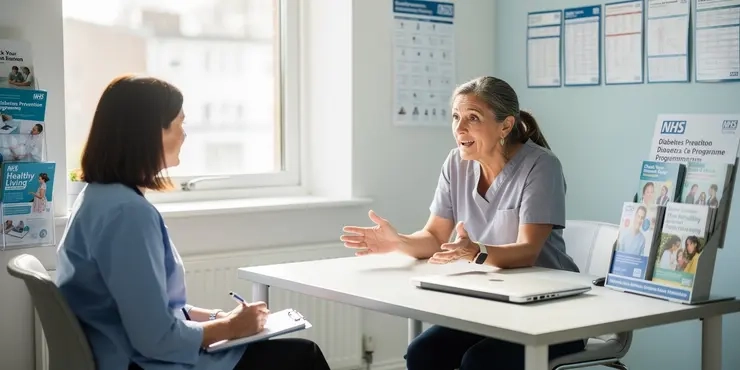
Hansa's story - The NHS Diabetes Prevention Programme
Relevance: 19%
-
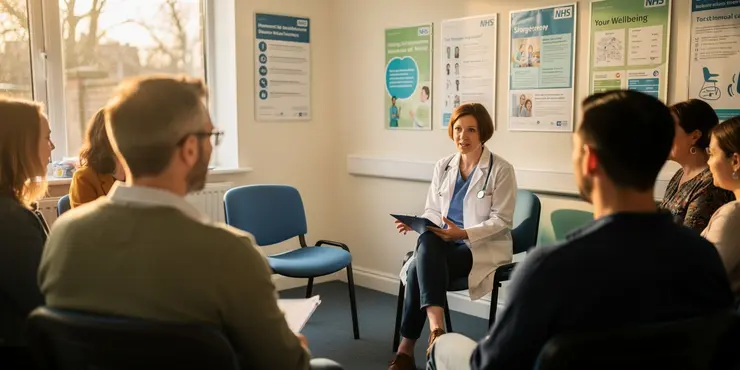
Tom's story (NHS Diabetes Prevention Programme)
Relevance: 19%
-

Tom's story (NHS Diabetes Prevention Programme)
Relevance: 19%
-
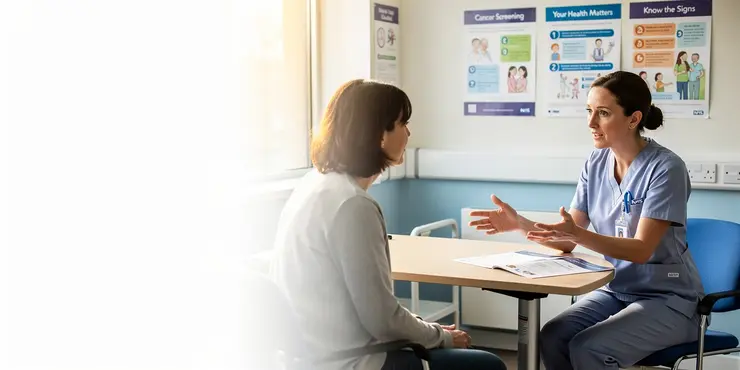
What is cancer screening?
Relevance: 19%
-
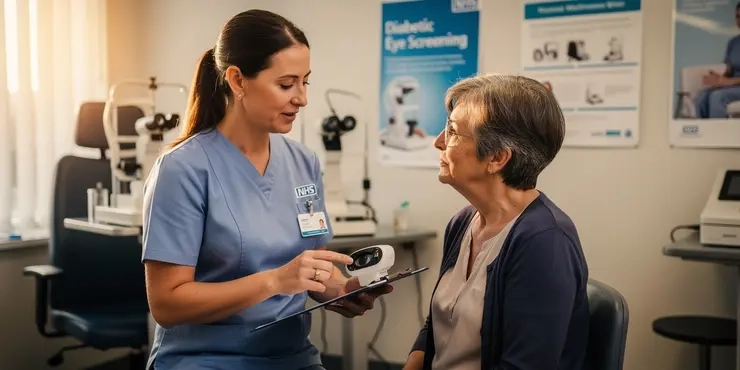
Derbyshire Diabetic Eye Screening - Your Screening Appointment
Relevance: 18%
-
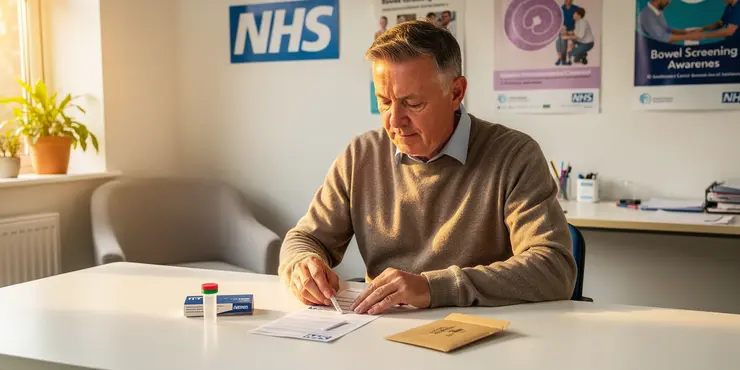
What are the recommendations for colorectal cancer screening?
Relevance: 18%
-
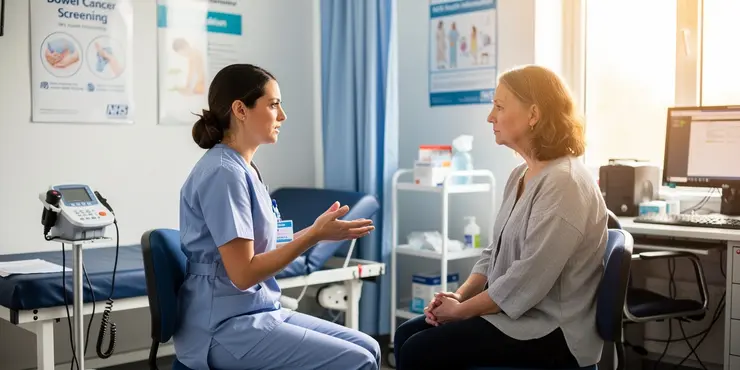
What kinds of cancer screening are available?
Relevance: 17%
-
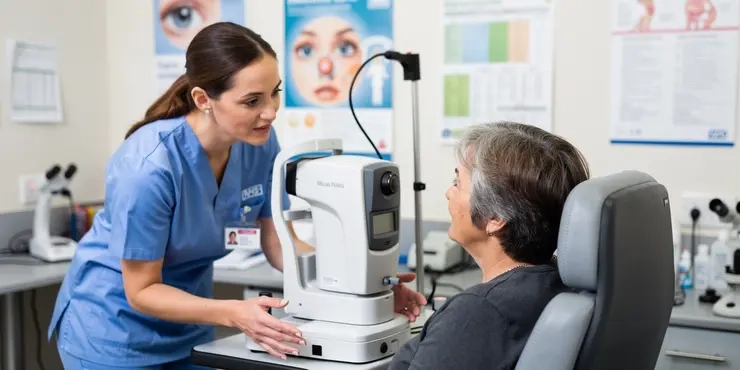
Diabetes Eye Screening
Relevance: 17%
-
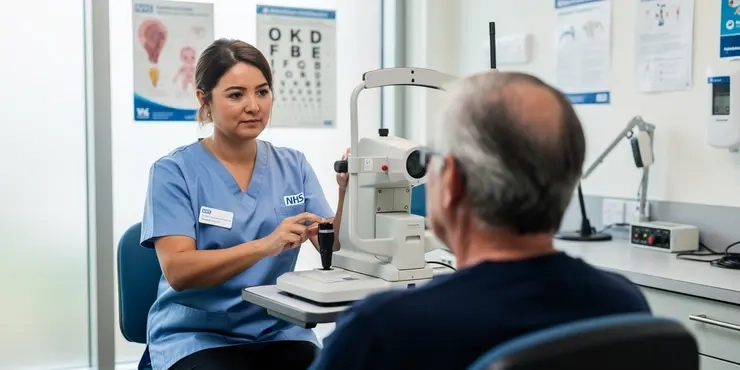
Derbyshire Diabetic Eye Screening - Diabetic Eye Screening
Relevance: 17%
-
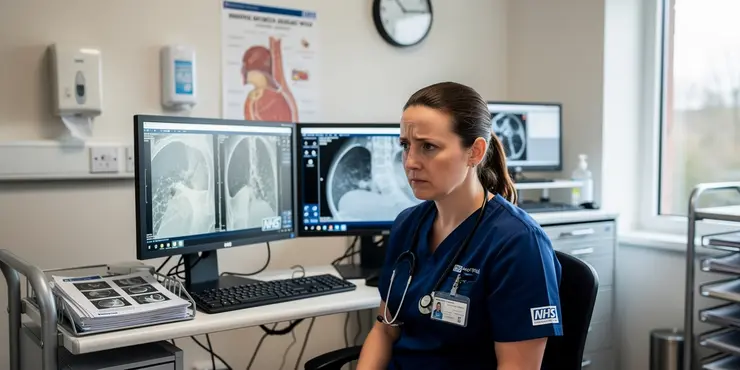
AI Breast Cancer Screening in the UK
Relevance: 17%
-
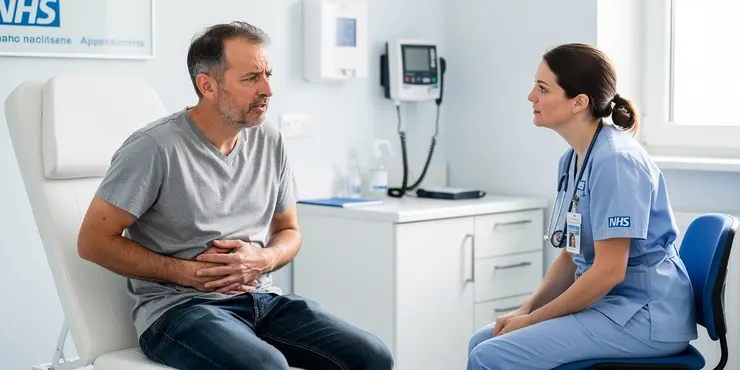
What are the potential complications of appendicitis?
Relevance: 16%
-
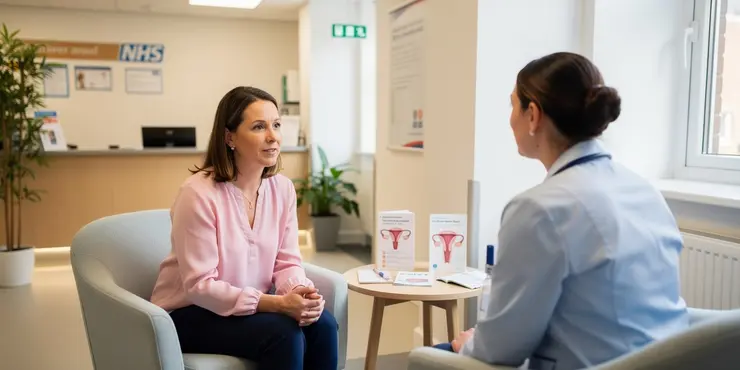
NHSGGC - Cervical Cancer Screening - English
Relevance: 16%
-
Is screening painful or risky for my child?
Relevance: 16%
-
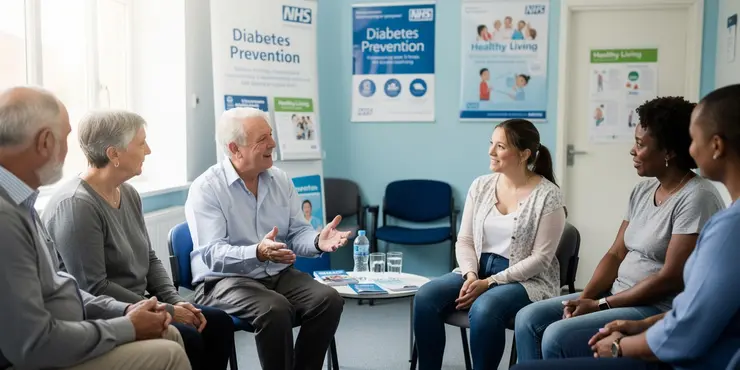
NHS Diabetes Prevention Programme; Preventing Type 2 and improving outcomes for people with diabetes
Relevance: 16%
-
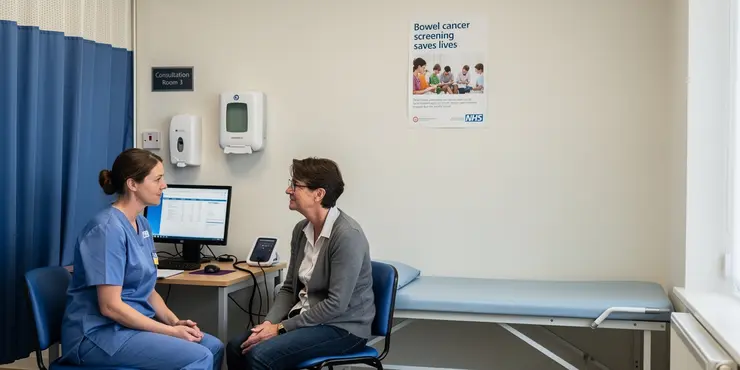
How does increased screening impact bowel cancer statistics?
Relevance: 16%
-
Where can I have my child screened for type 1 diabetes?
Relevance: 16%
-
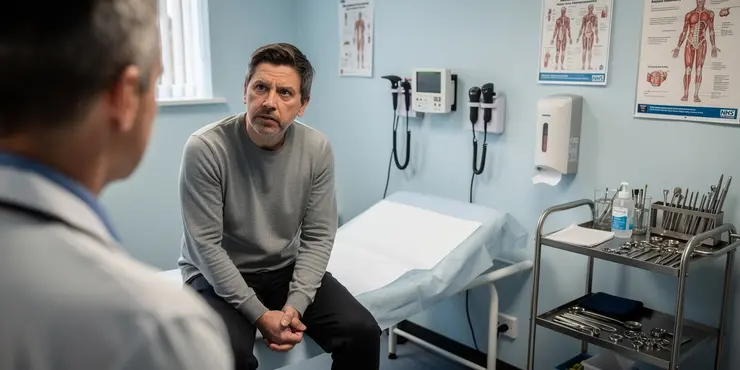
What happens if appendicitis is left untreated?
Relevance: 16%
-
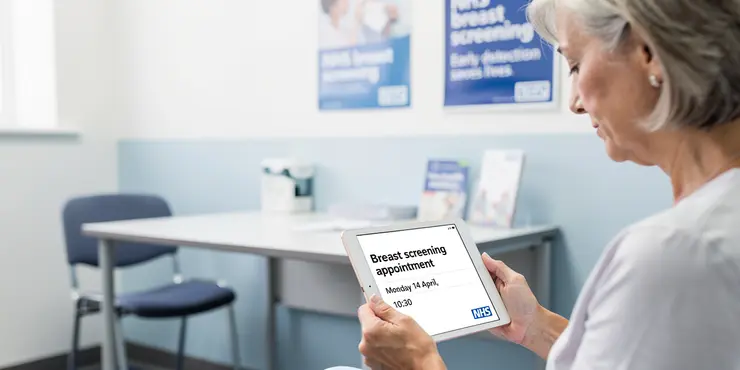
How often should I get screened for breast cancer?
Relevance: 15%
-
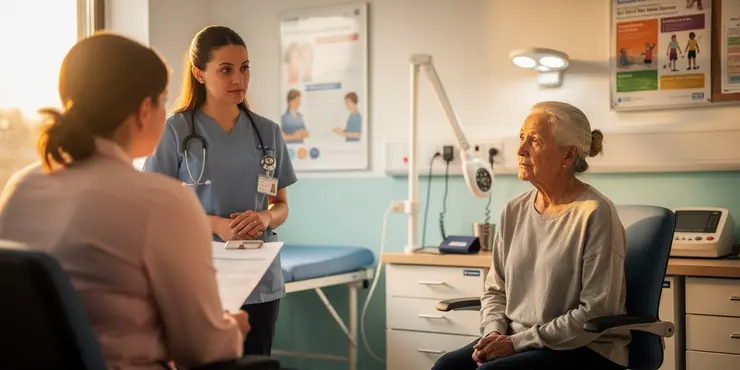
Bowel cancer - Symptoms and signs to look out for
Relevance: 15%
-
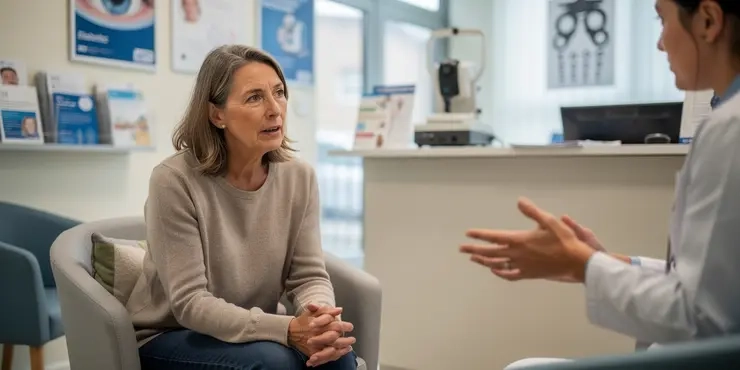
Derbyshire Diabetic Eye Screening - Assessment Clinic Appointment
Relevance: 15%
-

When should cervical cancer screening begin?
Relevance: 15%
-
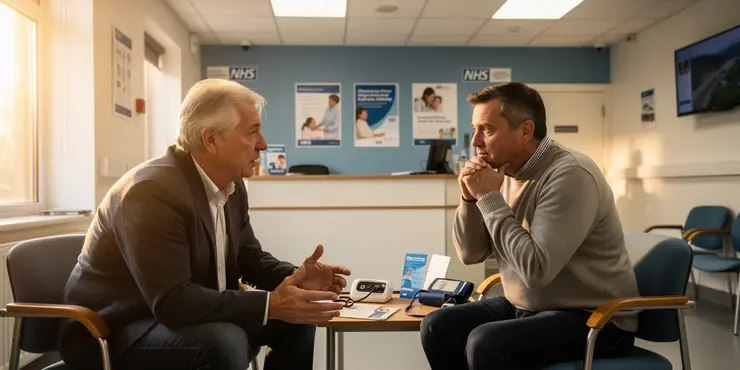
Bowel cancer screening: Alan Titchmarsh and Tommy Walsh | NHS
Relevance: 15%
Survivor of an Abdominal Aortic Aneurysm Rupture Appeals for Men to Take Up NHS Screening Programme
What is an Abdominal Aortic Aneurysm?
An abdominal aortic aneurysm (AAA) occurs when the large blood vessel (aorta) that supplies blood to the abdomen, pelvis, and legs becomes abnormally large or balloons outward. This condition can be life-threatening if the aneurysm bursts (ruptures), leading to massive internal bleeding. It often has no symptoms until it becomes severe, making early detection crucial for effective management and treatment.The Importance of Early Detection
Early detection of an AAA can save lives. The NHS screening programme aims to identify AAAs in men aged 65 and over, as they are at higher risk. The screening involves a quick and painless ultrasound scan that measures the size of the aorta. Identifying an aneurysm early allows for monitoring and intervention before it reaches a size where it is likely to burst.A Survivor's Appeal
John Smith, a 70-year-old resident of London, survived a potentially fatal AAA rupture due to rapid medical intervention. He shares his harrowing experience to encourage other men to take part in the NHS screening programme. "I had no idea I had an aneurysm. It was a ticking time bomb inside me," John recounts. His unexpected health crisis highlights the silent danger of AAAs and the importance of regular screening. John emphasizes, "I urge all men over 65 to get the screening. It might just save your life."The NHS Screening Programme
The NHS offers free AAA screening for men when they turn 65. Men over 65 who have not been screened previously can request a scan by contacting their local AAA screening service. The programme has been successful in reducing deaths from ruptured AAAs through early detection and preventative surgery. Public Health England reports that since the screening programme was introduced, there has been a decrease in AAA-related deaths among men aged 65 and over.How to Get Screened
Eligible men will receive an invitation from the NHS around their 65th birthday. Those over 65 who haven't been screened can self-refer by contacting their local screening provider. The scan usually takes place at a local clinic and involves no more than a 10-15 minute appointment. The results are immediate, and men are informed whether their aorta is normal, small, medium, or large - guiding future monitoring or treatment steps.Take Action Today
If you or someone you know is a man aged 65 or older and has not been screened for an AAA, taking action is simple and could be life-saving. The NHS AAA screening programme is an essential service that can prevent fatalities through early detection and timely intervention. For more information or to book a screening, visit the NHS website or contact your local healthcare provider.A Survivor Urges Men to Get NHS Check-ups
What is an Abdominal Aortic Aneurysm?
An abdominal aortic aneurysm (AAA) is when a big blood vessel in your tummy gets too big or puffs out. This blood vessel sends blood to your tummy, hips, and legs. If it gets too big and bursts, it can be very dangerous and cause lots of bleeding inside. Usually, there are no signs until it's serious. Finding it early is important so doctors can help.Why Finding it Early Matters
Finding an AAA early can save lives. The NHS checks men 65 and older because they have a higher chance of having this problem. The check-up is a fast and painless ultrasound scan to see how big the aorta is. If doctors find an AAA early, they can watch it and help before it bursts.A Survivor's Story
John Smith, who is 70 and lives in London, survived because doctors helped him fast. He wants other men to get the NHS check-ups. "I didn't know I had an AAA. It was like a hidden danger inside me," John says. He shares his story to warn people about AAAs being a quiet risk and tells men to get checked. "I ask all men over 65 to get checked. It could save your life."The NHS Screening Programme
The NHS gives free AAA checks to men when they turn 65. Men older than 65 who haven't had a check can ask for one. The programme has helped reduce deaths from AAAs. Public Health England says since the programme started, fewer men 65 and older are dying because of AAAs.How to Get Checked
Men who can get a check will get a letter from the NHS around their 65th birthday. Men over 65 who haven’t been checked can ask their local service. The scan happens at a local clinic and takes about 10-15 minutes. You find out right away if your aorta is normal, small, medium, or big, and what to do next.Act Now
If you or someone you know is a man 65 or older and hasn't been checked for an AAA, get checked. It's easy and can save lives. The NHS AAA check-up is a key service to stop deaths by finding issues early and helping in time. For more info or to book a check, visit the NHS website or talk to your local healthcare provider.Frequently Asked Questions
What is an abdominal aortic aneurysm (AAA)?
An abdominal aortic aneurysm (AAA) is a swelling or ballooning in the wall of the aorta, the main artery that runs from the heart down through the chest and abdomen. If it ruptures, it can cause life-threatening bleeding.
Why is AAA screening important?
AAA screening is important because most aneurysms have no symptoms until they rupture. Early detection through screening can help monitor the aneurysm and reduce the risk of a potentially fatal rupture.
Who is eligible for the NHS AAA screening programme?
Men aged 65 and over are eligible for the NHS AAA screening programme because they are at higher risk of developing an abdominal aortic aneurysm.
How is the AAA screening test conducted?
The AAA screening test involves a simple ultrasound scan of the abdomen. It's quick, painless, and usually takes about 10-15 minutes.
What happens if an aneurysm is found during screening?
If an aneurysm is found during screening, the size of the aneurysm will determine the next steps. Small aneurysms are monitored with regular scans, while larger aneurysms may require surgical intervention.
Are there any risks associated with the AAA screening test?
There are no significant risks associated with the AAA screening test. It is a safe and non-invasive procedure.
Is there a cost for AAA screening under the NHS?
No, the AAA screening programme is free for eligible individuals under the NHS.
Can women also get AAAs?
Yes, women can also develop AAAs, but the condition is less common in women, which is why the NHS screening programme primarily targets men aged 65 and over.
How can individuals find out about their eligibility for AAA screening?
Men will receive an invitation to attend screening during the year they turn 65. Men over 65 who have not been screened can request a scan by contacting their local screening service.
What are the risk factors for developing an AAA?
Risk factors for developing an AAA include being male, being over 65, having a family history of AAAs, smoking, high blood pressure, and high cholesterol.
What are the symptoms of an AAA rupture?
Symptoms of an AAA rupture include sudden, severe abdominal or back pain, dizziness, sweating, rapid heartbeat, and fainting. Emergency medical attention is required.
Can lifestyle changes help prevent an AAA?
Yes, lifestyle changes such as quitting smoking, eating a healthy diet, maintaining a healthy weight, and controlling blood pressure and cholesterol can help reduce the risk of developing an AAA.
What is the survival rate for an AAA rupture?
The survival rate for an AAA rupture is low, with approximately 80% of cases being fatal due to the rapid blood loss. Early detection and management are crucial.
How often are follow-up scans needed if a small aneurysm is detected?
If a small aneurysm is detected, follow-up scans are typically needed every 3 to 12 months to monitor the aneurysm's growth and detect any changes.
Where can more information about the NHS AAA screening programme be found?
More information about the NHS AAA screening programme can be found on the NHS website or by contacting local NHS screening services.
What is an abdominal aortic aneurysm (AAA)?
An abdominal aortic aneurysm (AAA) is a big bump in a large blood tube in your tummy. This bump can get bigger and can be dangerous.
If you want help to understand more, you can ask a doctor to explain. You can also use a picture or a video about AAA to learn. It is okay to ask questions if you do not understand.
An abdominal aortic aneurysm (AAA) is a big bump or balloon in the wall of the aorta. The aorta is the main blood tube. It goes from the heart, down through the chest, and tummy. If it breaks, it can cause very bad bleeding that can be dangerous.
Why is AAA screening important?
AAA screening checks for a big swelling in a blood tube in your tummy. This is called an aneurysm. It can make you very sick if it bursts. Checking early helps keep you safe.
If reading is hard for you, ask someone you trust to help explain. You can also try reading out loud or using tools that read the text for you.
AAA screening is important because most aneurysms do not show any signs until they burst. Finding them early by screening can help watch the aneurysm and lower the risk of it bursting, which can be very dangerous.
Who can get the NHS AAA test?
Men who are 65 years old and older can get a test from the NHS. This test checks for something called an abdominal aortic aneurysm. Older men have a greater chance of getting this problem, so it's important they get checked.
Here are some tips you might find helpful:
- Ask a doctor or nurse for help if you need it.
- Talk to family or friends if you have questions.
- Use pictures or videos to understand better.
How is the AAA screening test done?
The AAA screening test checks for a big bump in your tummy blood tube. It is called an aneurysm. Here is how the test is done:
- You lie down on a bed.
- A nurse or doctor puts some jelly on your tummy.
- They use a small tool to look inside your tummy. It is like a camera but uses sound waves.
- The tool shows pictures on a screen.
- It does not hurt and is very quick.
If you need help understanding this or remembering things, maybe ask someone you trust to come with you. They can help listen and ask questions. You can also use pictures or drawings to remember what will happen.
The AAA test checks your tummy using a special scan. It is quick and does not hurt. It usually takes about 10 to 15 minutes.
What happens if a doctor finds an aneurysm during a check-up?
If doctors find an aneurysm during a check-up, they look at how big it is. If it is small, they will check it often with scans. If it is big, they may need to do surgery.
Are there any dangers with the AAA test?
The AAA screening test is safe. It does not hurt your body. There are no big risks.
Do you have to pay for AAA screening with the NHS?
If you get an AAA test with the NHS, it is free. You do not need to pay.
No, the AAA screening programme is free for people who qualify under the NHS.
AAA Screening: This is a special check-up to look at a big blood vessel in your tummy.
NHS: This is the health care service in the UK. They help people stay healthy.
Extra Help: If you find reading hard, ask a friend or family member for help. You can also try using audiobooks or read-aloud tools on your computer or tablet. These can make it easier to understand the information.
Can women also have AAAs?
Yes, women can have AAAs. An AAA, or Abdominal Aortic Aneurysm, is a swelling in a big blood vessel in the tummy. It is more common in men, but women can have it too.
To stay healthy, it is good to see a doctor if there is pain in the tummy or back. Doctors can do special tests to check for AAAs.
Talking to a friend or family member can be helpful. They can go with you to the doctor.
Yes, women can get AAAs (that's a kind of swelling in a big blood tube), but it happens less often in women. This is why doctors mainly check men age 65 and older for it.
How can people check if they can get AAA screening?
If you want to know if you can get AAA screening, do this:
- Talk to your doctor. They can tell you if you need the test.
- Check letters from your doctor or hospital. They might send you a letter if you can get screening.
- Some places have websites where you can check. Ask someone to help you look online.
Using a calendar or asking a friend to remind you can help you not to forget appointments or check-ups.
Men will get a letter to come for a check-up the year they turn 65. Men older than 65 who have not had this check-up can ask for one by calling their local check-up place.
What makes getting an AAA more likely?
Some things can make it more likely for someone to get an AAA. These include being a man, being older than 65, having family members who had AAAs, smoking, having high blood pressure, and having high cholesterol.
What happens if an AAA bursts?
An AAA is a big blood tube in your tummy. If it bursts, it can be very serious. Here are some signs to watch for:
- Strong pain in your belly or lower back.
- Feeling weak or dizzy.
- Feeling very cold and sweaty.
- Nausea or throwing up.
If you see these signs, tell an adult or a doctor right away. It is important to act fast.
Helpful tips:
- Use a picture or drawing to understand better.
- Ask someone to explain it to you if you're not sure.
If an AAA bursts, you might feel very bad pain in your belly or back. You could feel dizzy, start sweating a lot, have a fast heartbeat, or faint. You need to call for help right away.
Can changing how you live stop an AAA from happening?
An AAA is a big bump in a blood tube near your heart. Changing how you live can help. Here are some ideas:
- Eat healthy food like fruits and vegetables.
- Do activities like walking or playing outside.
- Stop smoking if you do; it is not good for your health.
- Go to the doctor to check your heart and blood.
It is important to look after your body. If you need more help, you can talk to a doctor or use simple apps to remember healthy habits.
Yes, changing how you live can help. Stop smoking, eat healthy foods, keep a healthy weight, and make sure your blood pressure and cholesterol are good. These things can help you stay safe from AAA.
How many people survive an AAA rupture?
An AAA rupture is when a big blood vessel bursts in the tummy. Here’s a simple way to understand: - Not many people survive when this happens. To learn more or if you need help, you can: - Talk to a doctor - Look for easy-to-understand health websites - Ask someone to explain it to youThe chance of surviving a burst belly artery (AAA) is low. About 80 out of 100 people do not live because they lose a lot of blood very quickly. Finding the problem early and getting help fast is very important.
Here are some ways to understand and remember this:
- Ask someone to explain it with a picture or a drawing.
- Use simple words or number examples to explain 80 out of 100.
- Listen to the information out loud or watch a video to help it make sense.
How many times do doctors need to check a small aneurysm with a scan?
If doctors find a small aneurysm in your body, they will want to keep an eye on it. This means doing scans every now and then. A scan is a special picture that shows what is happening inside your body.
Here is what you need to know:
- Doctors usually do these scans every few months or every year.
- The doctor will tell you how often you need a scan. It depends on how big the aneurysm is.
- These scans help doctors see if the aneurysm is changing or getting bigger.
- Doing regular scans helps keep you safe and healthy.
If you find it hard to remember when your scans are, you can:
- Use a calendar or diary to write down the scan dates.
- Ask someone to help remind you about your appointments.
- Set a reminder on your phone if you have one.
If a small bulge in a blood vessel is found, doctors will usually want to check it again to see if it changes. They do this with special pictures, called scans, every 3 to 12 months.
Where can you find more information about the NHS AAA screening program?
You can find more information about the NHS AAA screening program on the NHS website. It can help to use tools like a screen reader or ask someone to help you read the website. If you need more help, you can call your doctor or nurse and ask them about the program.
You can learn more about the NHS AAA screening programme. Visit the NHS website or ask your local NHS screening services for information.
Useful Links
This website offers general information and is not a substitute for professional advice.
Always seek guidance from qualified professionals.
If you have any medical concerns or need urgent help, contact a healthcare professional or emergency services immediately.
Some of this content was generated with AI assistance. We’ve done our best to keep it accurate, helpful, and human-friendly.
- Ergsy carfully checks the information in the videos we provide here.
- Videos shown by Youtube after a video has completed, have NOT been reviewed by ERGSY.
- To view, click the arrow in centre of video.
- Most of the videos you find here will have subtitles and/or closed captions available.
- You may need to turn these on, and choose your preferred language.
- Go to the video you'd like to watch.
- If closed captions (CC) are available, settings will be visible on the bottom right of the video player.
- To turn on Captions, click settings .
- To turn off Captions, click settings again.
More Items From Ergsy search
-

Survivor of an Abdominal Aortic Aneurysm rupture appeals for men to take up NHS Screening Programme.
Relevance: 100%
-

Abdominal Aortic Aneurysm (AAA) screening programme
Relevance: 94%
-

AAA (Abdominal aortic aneurysm) screening
Relevance: 85%
-

NHS Abdominal Aortic Aneurysm (AAA) Screening
Relevance: 83%
-

Eddie's Story - Abdominal Aortic Aneurysm (AAA) Screening
Relevance: 83%
-

Your abdominal aortic aneurysm (AAA) screening appointment
Relevance: 78%
-

Repairing complex aortic aneurysm
Relevance: 62%
-

Tower Hamlets breast screening programme
Relevance: 32%
-

North Yorkshire Diabetic Eye Screening Programme - A day in the life
Relevance: 29%
-

Health Screenings You Should Know About
Relevance: 23%
-

NHS breast cancer screening
Relevance: 21%
-

What is it like having a Transcutaneous Aortic Valve Implant (TAVI)?
Relevance: 21%
-

How is appendicitis different from other causes of abdominal pain?
Relevance: 20%
-

Stomach ache and abdominal pain
Relevance: 20%
-

The NHS Diabetes Prevention Programme story
Relevance: 20%
-

Can I do abdominal exercises during pregnancy?
Relevance: 20%
-

Facial exercise programme
Relevance: 19%
-

Pam’s story - The NHS Diabetes Prevention Programme
Relevance: 19%
-

Hansa's story - The NHS Diabetes Prevention Programme
Relevance: 19%
-

Tom's story (NHS Diabetes Prevention Programme)
Relevance: 19%
-

Tom's story (NHS Diabetes Prevention Programme)
Relevance: 19%
-

What is cancer screening?
Relevance: 19%
-

Derbyshire Diabetic Eye Screening - Your Screening Appointment
Relevance: 18%
-

What are the recommendations for colorectal cancer screening?
Relevance: 18%
-

What kinds of cancer screening are available?
Relevance: 17%
-

Diabetes Eye Screening
Relevance: 17%
-

Derbyshire Diabetic Eye Screening - Diabetic Eye Screening
Relevance: 17%
-

AI Breast Cancer Screening in the UK
Relevance: 17%
-

What are the potential complications of appendicitis?
Relevance: 16%
-

NHSGGC - Cervical Cancer Screening - English
Relevance: 16%
-
Is screening painful or risky for my child?
Relevance: 16%
-

NHS Diabetes Prevention Programme; Preventing Type 2 and improving outcomes for people with diabetes
Relevance: 16%
-

How does increased screening impact bowel cancer statistics?
Relevance: 16%
-
Where can I have my child screened for type 1 diabetes?
Relevance: 16%
-

What happens if appendicitis is left untreated?
Relevance: 16%
-

How often should I get screened for breast cancer?
Relevance: 15%
-

Bowel cancer - Symptoms and signs to look out for
Relevance: 15%
-

Derbyshire Diabetic Eye Screening - Assessment Clinic Appointment
Relevance: 15%
-

When should cervical cancer screening begin?
Relevance: 15%
-

Bowel cancer screening: Alan Titchmarsh and Tommy Walsh | NHS
Relevance: 15%


